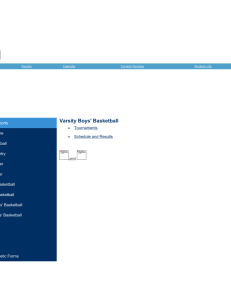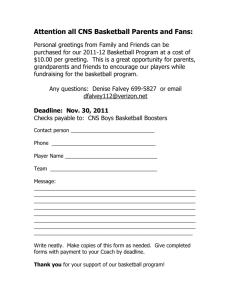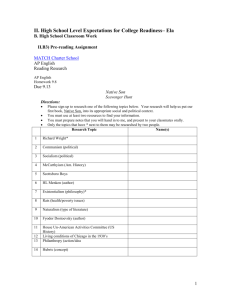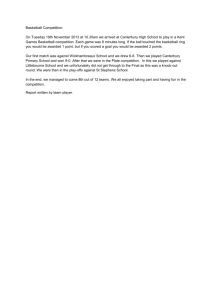Welcome to McClure
advertisement
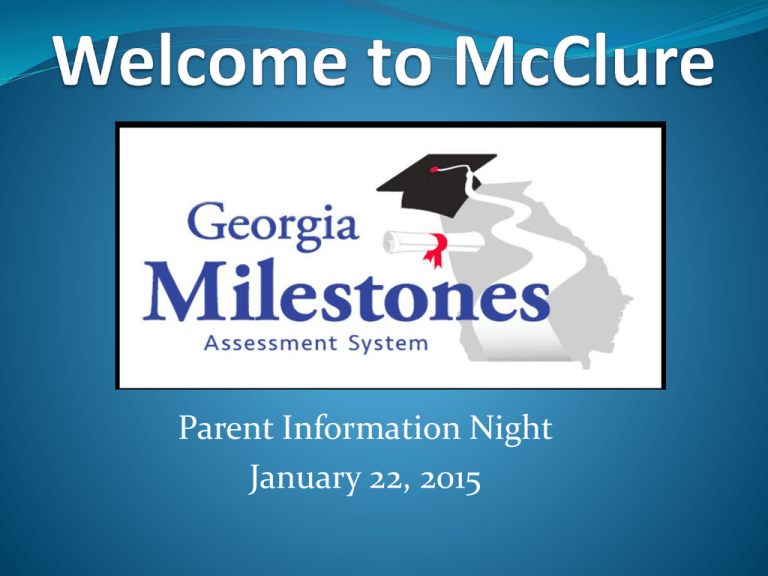
Parent Information Night January 22, 2015 Why the Change? To ensure consistent expectations and rigor so our students can compete with peers nationally (NAEP, PSAT, SAT, ACT), indicator of student preparedness for the next level, grade, course, or college/career, and indicator of student achievement across grades/courses within Cobb. Why the Change? What to Expect? Grades 3-8 End of Grade (EOG) in ELA, Math, Sci, SS CRCT or CRCT-M no longer administered GA Milestones -Breakdown ELA MATH 3 sections 60-70 min. Lang arts, reading, writing Writing 70-90 min. 2 sections 60-80 min. GA Milestones -Breakdown SCIENCE SOCIAL STUDIES 2 sections 2 sections 50-70 min. 50-70 min. What to Expect? Paper-pencil or online tests All special education students with read-to accommodations will take online What to Expect? Types of Test Items Criterionreferenced Normreferenced Items that reflect content standards Each grade and course Items that allow for national comparison of our students Do not necessarily reflect the GA content standards – will not count in student score Each grade and course What to Expect? Types of Test Questions Selectedresponse Constructedresponse Extendedresponse • “multiple choice” • generated by student as opposed to selecting a response • Require explanations of reasoning • Allow for multiple correct answers • Examples: writing prompts or performance tasks ELA – What are we doing to prepare students? Students will be familiar with much of the test. For example: Read an article about the history of basketball, then answer this question: ELA- What are we doing to prepare students? Example of constructed response prompt: What is the author’s purpose in writing the passage? Use details from the passage to support your answer. Example of student answer (basketball article): The author’s purpose is to explain the history of basketball. The passage starts out by telling who invented basketball and why he did it. Then it talks about how the game changed and developed over the years. Finally, it describes how it became a sport played all over the world. ELA- What are we doing to prepare students? Example of extended response prompt: Math – What are we doing to prepare students? Math – Which Calculator? th th th 6 7 8 Basic 4-Function Scientific Calculator Can include % and √ No memory function Science - What are we doing to prepare students? STEM Problem Based Learning Warm-ups/Assessments with Milestone type questions Science- What are we doing to prepare students? 7th Grade: Natural disasters can cause short- and longterm changes in environmental conditions. These changes can affect individual plants and animals, as well as an entire species. Which of these would MOST LIKELY lead to the extinction of a species? A. A tsunami passes over a coral reef where a threatened fish species lives. B. A wildfire moves through the last remaining habitat of an endangered plant species. C. A hurricane moves through a nature preserve where a population of threatened birds is nesting. D. An earthquake disturbs a wilderness area where the last known population of an endangered mammal lives. Social Studies – What are we doing to prepare students? Will require understanding of the past and its influence on the present and future Four domains: History (47%) Geography (12%) Government and Civics (25%) Economics (16%) • Selected-response items only. Social Studies – What are we doing to prepare students? "The Colony of Georgia lying about the same latitude with part of China, Persia, Palestine, and the Madeiras, it is highly probable that when hereafter it shall be well peopled and rightly cultivated, England may be supplied from thence with raw Silk, Wine, Oil, Dyes, [Medicines], and many other materials for manufactures, which she is obliged to purchase from Southern countries." —James Oglethorpe, 1733 Which statement about early Georgia settlers is BEST supported by the information in the quotation? A They believed they were dependent on importing goods from England. B They thought they could benefit from the area's warm climate and fertile soil. C They thought they could trade goods with many countries in Asia and the Middle East. D They believed the area's resources would allow them to specialize in limited agricultural products. What was learned from pilot school testing? Students . . . Responded with “dnk” (do not know). Did not show work, cite evidence, or support answer or claim with rationale. Did not read carefully and answer all parts. What Can You Do to Prepare Your Son/Daughter? http://www.gadoe.org/Curriculum-Instruction-and- Assessment/Assessment/Pages/Georgia-MilestonesAssessment-System.aspx Last Words April 15-24 (5 actual days of testing) High school courses with additional end-of-course test – given in May: Coordinate algebra Coordinate algebra and geometry Physical science Standard setting –scores will be released in September The ratings to be used have not been determined- meets, exceeds etc. No retest Questions? We will stick around for a few minutes!
